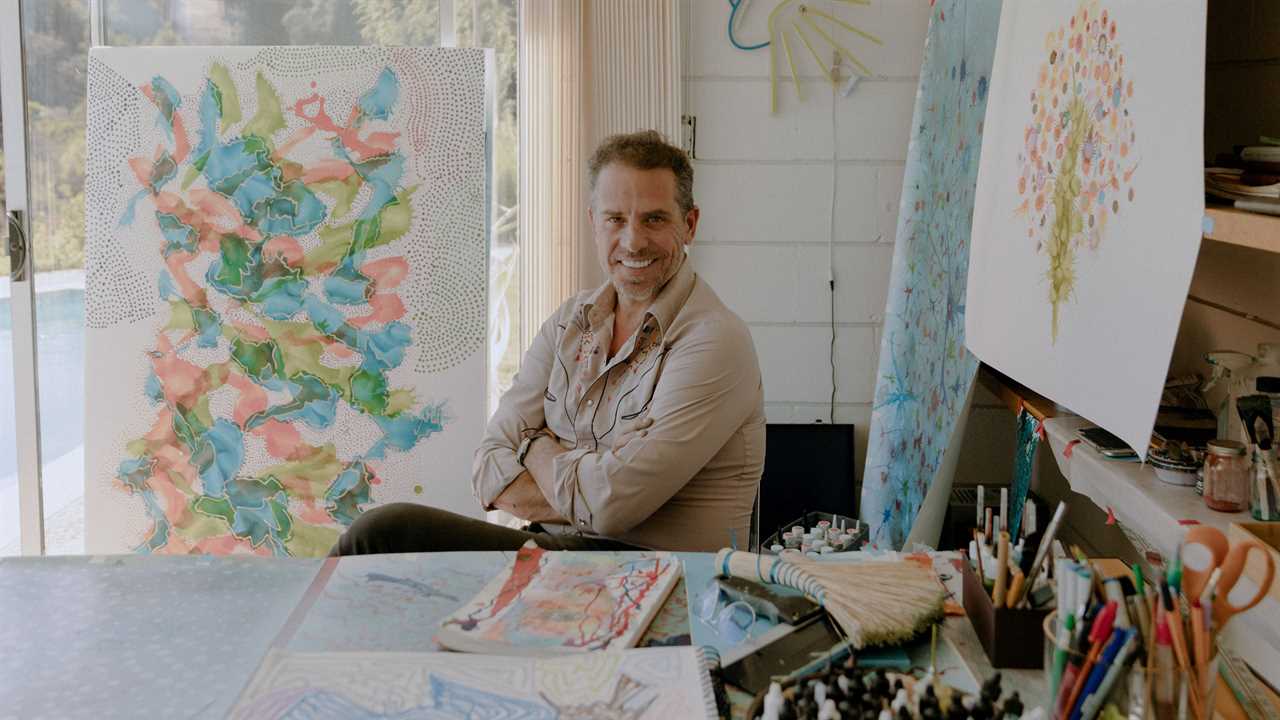
WASHINGTON — The White House has helped develop a system for Hunter Biden to sell pieces of his art without him, or anyone in the administration, knowing who bought them, the latest effort to respond to criticism over how President Biden’s son makes his money.
Under the arrangement, a New York City art dealer would sell the paintings, which the dealer has said he is pricing at between $75,000 and $500,000, while keeping secret all information about the sales, according to a person familiar with the plan.
The gallerist, Georges Bergès, has agreed to not share any information about the buyers or prices of Hunter Biden’s work with anyone. Mr. Bergès has also agreed to reject any offer that appears suspicious, such as one well beyond the asking price, the person familiar with the matter said.
Hunter Biden has been under scrutiny for years over business dealings around the world that often intersected with his father’s official duties. His work in Ukraine in particular became a political flash point, helping to lead indirectly to the first impeachment proceedings against President Donald J. Trump, and his business dealings in China became a campaign issue last year.
Hunter Biden is also under investigation by the U.S. attorney’s office in Delaware over his taxes. He has said he is confident he will be cleared of any wrongdoing.
He has taken up painting in recent years, and his efforts to sell his works created a new ethics challenge for the White House, which came under pressure to ensure that buyers would not purchase them in an effort to curry favor with or gain access to the administration.
While some government ethics watchdogs defended the right of the president’s adult son to pursue a career, others raised concerns that the new arrangement lacked sufficient safeguards to prevent improper influence over the administration from potential purchasers.
Virginia Canter, the chief ethics council at Citizens for Responsibility and Ethics in Washington, a government watchdog, questioned what would stop purchasers of the artwork from subsequently making public they had bought a painting by Hunter Biden.
“I think it’s creative,” Ms. Canter said. “I guess they want to manage the conflict but the problem will be enforcement. Unless you have the purchaser sign nondisclosure agreements, this information would come out.”
The administration should also specifically prohibit officers of foreign governments from purchasing the pieces of art, she said. The Treasury Department warned last year that the anonymity of high-value art transactions could make the market attractive to those engaging in illegal financial activities or people subject to U.S. sanctions.
Andrew Bates, a spokesman for the White House, said the arrangement, which was previously reported by The Washington Post, would ensure ethical dealings.
“The president has established the highest ethical standards of any administration in American history, and his family’s commitment to rigorous processes like this is a prime example,” Mr. Bates said in a statement.
Chris Clark, Hunter Biden’s attorney, did not respond to requests for comment. Mr. Bergès did not respond to a request for comment. An employee who answered the phone at his gallery declined to comment on the arrangement and said Mr. Bergès was not available.
Some ethics watchdogs said the arrangement did not go far enough.
“This was a perfect opportunity for the Biden White House to demonstrate how they are committed to elevating ethics and not allowing their family to trade in on the power of the White House,” said Danielle Brian, the executive director of the Project on Government Oversight. “They’ve disappointed us. This was a missed opportunity, and I think they’ve gone in the wrong direction.”
The White House is confident the arrangement will prevent anyone from citing a purchase of Hunter Biden’s art as proof of connection to the administration, according to a person familiar with the plan. If a buyer did go public with information about a purchase, administration officials would be discouraged from ever working with that person, the person said.
The venture into the world of high-priced art appears to be the next phase for the president’s son after years of criticism over his business dealings, especially during the time when his father was vice president.
Hunter Biden was paid $50,000 a month or more to serve on the board of Burisma, a Ukrainian energy company owned by an oligarch who was widely seen as corrupt, advised a wealthy Romanian business executive facing corruption charges and invested in a private equity fund linked to the Chinese government.
Mr. Trump’s first impeachment trial centered on charges that the president abused his powers by pressuring the government of Ukraine to announce an investigation into Hunter Biden’s dealings there in an effort to damage the Biden campaign.
Mr. Biden has repeatedly defended his son’s work.
Hunter Biden has described painting as a form of therapy after a history of addiction to drugs and alcohol.
Painting “is literally keeping me sane,” he told The New York Times last year. “For years I wouldn’t call myself an artist. Now I feel comfortable saying it.”
Mr. Bergès told Artnet News last month that he expected Hunter Biden’s art pieces to be sold for as much as $500,000.
Did you miss our previous article...
https://trendinginthenews.com/usa-politics/mexico-to-allow-union-vote-at-gm-plant-after-us-complaint






